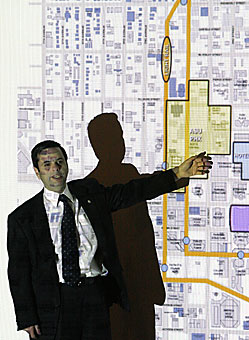 |
|
MATT ROBLES/Arizona Daily Wildcat
|
Phoenix mayor Phil Gordon answers questions at a meeting Friday afternoon in Duval Auditorium at University Medical Center discussing the UA medical school's expansion to Phoenix.
|
|
|
By Lisa Rich
Arizona Daily Wildcat
Monday, December 6, 2004
Print this
Expansion plans to establish the UA College of Medicine and College of Pharmacy at Arizona State University's Biomedical Campus in Phoenix are underway, with classes expecting to start in fall 2006, said Phil Gordon, mayor of Phoenix and 1972 UA alum.
Gordon spoke to approximately 150 Tucson residents and UA faculty at a town hall meeting Friday at University Medical Center, where he updated the audience on the design, development and financial status of the expansion.
The Arizona Board of Regents approved plans to expand the two colleges to Phoenix in August, when concerns rose about whether or not UA's medical program would become overpopulated and underdeveloped, said Janet Bingham, vice president of UA advancement.
Since then, Bingham said the UA has been working with Gordon and Phoenix council members to annex UA colleges of medicine and pharmacy to ASU's developing biomedical campus.
Although the expanded colleges will be in Phoenix, Bingham stressed that they will still be considered UA colleges.
Expanding the colleges will allow classes of 24 students, which will aid small group learning and stronger teacher-student relationships, said Keith Joiner, College of Medicine dean.
The UA and city of Phoenix are working to assess the colleges' infrastructures, facilities and recruiting needs, Joiner said.
Once the expansion is complete, Joiner said one college of medicine will exist under one accreditation, or "stamp of approval." However, he said the college will be located at two separate campuses, which has never been done before in the United States.
John Murphy, College of Pharmacy assistant dean, said the expansion will help relieve the shortage of medical technicians and pharmacists in Arizona, while providing students with additional research opportunities and equipment not available at UA.
In addition to benefiting the UA economically and academically, the redevelopment will also enrich the plan for a medical school in Phoenix, Gordon said.
"Phoenix is the fifth-largest city in the U.S., and is the largest city without a medical school," Gordon said. "We're training the most important need for our state. This partnership is one great linkage that will benefit everybody."
Gordon said although many were skeptical about the possibility to expand the colleges and develop the Phoenix biomedical center, the vision he had is quickly becoming a reality thanks to the shared competitiveness, communication and mutual goal to succeed between ASU and the UA.
"It's helped us move this forward," Gordon said.
Completing the project within the determined time frame is also important, as long as it does not sacrifice the quality and vision of the expansion, he said.
Although the annex colleges will be in Phoenix, Gordon said the administration, curriculum and management will be from the UA. The expansions are expected to be completed by 2008 and are anticipated to accommodate 15,000 students and faculty, he said.
Murphy said students in the colleges of medicine or pharmacy will most likely be able to choose which campus they prefer to study and research at, and he is optimistic about the student reaction to the finished expansion.
Murphy said students who do not want to travel to Phoenix would have the option to continue studying in Tucson; however, those studying at the expanded college will benefit from additional research opportunities and advanced equipment that are not offered at the UA.
Gordon has set aside 25 acres of underutilized property in the downtown Phoenix area to the UA for the biomedical campus, which will include the UA colleges of medicine and pharmacy, the Translational Genomics Research Institute, a hospital and a housing unit for researchers from the UA, ASU and other organizations.
The appropriated land will be donated to the UA, with expenses being paid by the city of Phoenix, Gordon said.
Financial costs of the project are yet to be determined, said Gordon, who admits the project is "no small investment." Gordon said he expects the physical and operational costs to be contributed by private sector and foundation donations, as well as the state legislature.
Since the expansion is expected to medically benefit the entire state, Gordon said he believes a portion of the cost is the state's obligation, and he does not expect funding resistance.
The total cost for the project will be determined after physical and operational costs are assessed. Gordon said he expects a final design to be proposed at a governor's commission meeting by early March.
 |
We're training the most important need for our state. This partnership is one great linkage that will benefit everybody.
– Phil Gordon, mayor of Phoenix
|
 |
